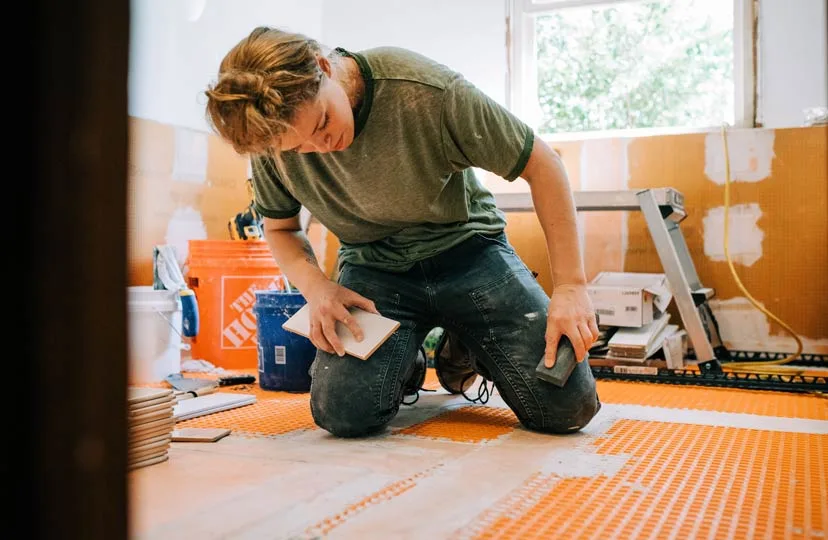Are you considering installing new flooring in your home? If so, you may wonder whether to undertake a do-it-yourself (DIY) project or hire a professional flooring installer. To help you make the best decision, weighing the pros and cons of each approach is essential.
DIY flooring installation has several advantages. First and foremost, it can save you significant money on labor costs. By doing the work yourself, you can avoid paying for professional services and instead invest in higher-quality materials or other home improvement projects. Additionally, DIY installation allows you complete control over the project, from selecting the perfect flooring materials to setting your timeline.
However, there are also some potential downsides to consider. Unless you have experience with flooring installation, you may find the process challenging and time-consuming. Mistakes can be costly, and improper installation can result in a less-than-perfect finished product. Furthermore, if you encounter unexpected issues or complications during the installation process, you may need to spend additional time and money to resolve them.
On the other hand, hiring a professional flooring installer can also have its benefits. Experienced professionals have the necessary skills and expertise to complete the job quickly and efficiently, saving you time and hassle. Additionally, professional installers can handle complex installations that may be too difficult or risky for a DIY project.
However, professional installation can also be expensive. Labor costs can add up quickly, and you may be limited in choosing materials based on your budget. Additionally, you may need more control over the project timeline and the finished product, as the installer will make many decisions on your behalf.
Ultimately, deciding to pursue a DIY or professional flooring installation depends on your needs, budget, and skill level. By carefully weighing the pros and cons of each approach, you can make an informed decision that will result in beautiful, functional, and long-lasting flooring for your home.
Pros of DIY Flooring Installation:
1. Cost Savings:
One of the primary advantages of the DIY approach is potential cost savings. Homeowners can allocate more of their budget toward high-quality flooring materials by eliminating labor costs.
2. Sense of Accomplishment:
Completing a DIY flooring project can provide tremendous accomplishment and pride. It allows homeowners to take ownership of their home improvement, showcasing their skills and creativity.
3. Flexible Schedule:
DIY projects allow for greater flexibility in terms of scheduling. You can work at your own pace, taking breaks or adjusting the timeline based on availability.
4. Customization:
DIY installations offer the opportunity for more personalized touches. Homeowners can experiment with unique patterns, layouts, or custom inlays to create a unique flooring design.
Cons of DIY Flooring Installation:
1. Skill and Expertise:
Lack of experience and expertise can lead to errors in installation. Improperly installed flooring may result in issues like uneven surfaces, gaps, or premature wear and tear.
2. Time-Consuming:
DIY projects often take longer to complete than professional installations. Time constraints may become a significant factor, especially for those with busy schedules.
3. Limited Warranty:
Many flooring warranties require professional installation to remain valid. Opting for a DIY approach may void these warranties, leaving homeowners responsible for any potential issues.
Pros Of Hiring A Professional Flooring Installer:
1. Quality Workmanship:
Professional installers bring years of experience and expertise to the table. This ensures high-quality craft, reducing the likelihood of installation errors and ensuring a longer lifespan for your flooring.
2. Time-Efficient:
Professionals work efficiently, often completing projects in a fraction of the time it would take for a DIY enthusiast. This is particularly beneficial for large or time-sensitive projects.
3. Warranty Protection:
Most flooring manufacturers require professional installation to uphold their warranties. Hiring professionals ensures your investment is protected and any issues can be addressed under warranty.
4. Expert Advice:
Flooring professionals can advise on material selection, layout design, and maintenance. Their expertise ensures that you make informed decisions throughout the process.
Cons Of Hiring A Professional Flooring Installer:
1. Higher Costs:
The primary drawback of hiring professionals is the associated cost. Labor fees can significantly increase the overall project expense, especially for high-end materials or complex installations.
2. Less Personal Involvement:
Some homeowners enjoy the hands-on experience of DIY projects. Choosing professional installation means relinquishing some control and personal involvement in the actual installation process.
Regarding flooring installation, you have two options: DIY or hiring a professional. This decision should be based on your priorities, skill level, and project complexity. If you enjoy taking on home improvement projects and value a sense of accomplishment, then a DIY approach might be the best fit for you. Not only can you save some money, but you can also have more control over the process and design decisions.
However, hiring a professional is the way to go if you are dealing with a complex project, lack time or experience, or simply want the job done right. Professional installation guarantees quality craft, fast turnaround times, and warranty protection. They have the right tools, expertise, and experience to handle a variety of materials, including hardwood, tile, carpet, and laminate flooring, while ensuring a smooth and seamless finish.
It’s essential to weigh each option’s pros and cons before deciding. While DIY projects offer a sense of accomplishment and potential cost savings, they require significant time, effort, and skill. On the other hand, professional installations may be more expensive, but they provide peace of mind and ensure a successful flooring transformation in your home. Ultimately, it comes down to your goals and priorities.



